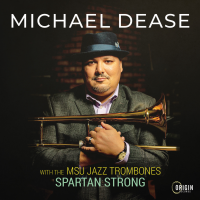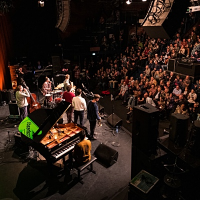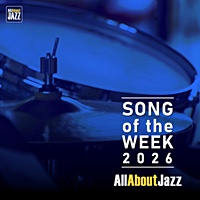Home » Jazz Articles » Albert Ayler
Jazz Articles about Albert Ayler
Albert Ayler, Jones Jones, Jonathan Reisen & Charles Mingus

by Maurice Hogue
Two previously unreleased recordings by two of the seminal artists in creative music get sampled this time out: Albert Ayler's Revelations—The Complete ORTF 1970 Fondation Maeght Recordings and Charles Mingus' The Lost Album From Ronnie Scott's. For Ayler, this was his last recorded music before he died later that year. The tapes for the Mingus release sat untouched in the Mingus Archives until now. Other new recordings sampled are the Jones Jones Trio of Larry Ochs, Mark Dresser & Vladimir ...
Continue ReadingAlbert Ayler: Revelations

by Chris May
There are lovingly curated box sets and there is Albert Ayler's Revelations: The Complete ORTF 1970 Fondation Maeght Recordings. The 5 x LP / 4 x CD set documents in full the two concerts Ayler gave at the high-end performance and visual arts facility in Provence, France in July 1970, just four months before he passed, so tragically and prematurely. Everything about the release is near perfect, from the sonics through to the hundred-page booklet which project producer Zev Feldman ...
Continue ReadingAlbert Ayler: La Cave Live-Cleveland 1966-Revisited

by Chris May
Cleveland club La Cave, a grungy cellar which could accommodate around two hundred people, opened as a folk venue in 1962, transitioned into rock mid-decade, and closed in 1969. Along the way, in amongst such counterculture flagbearers as the Velvet Underground and The Fugs, La Cave booked a few of the bad boys of so-called “new thing" jazz, among them tenor saxophonist Albert Ayler, a Cleveland hometown hero. The 2xCD La Cave Live-Cleveland 1966-Revisited comprises just over ...
Continue ReadingFire Music: The Story of Free Jazz

by Chris May
Fire Music: The Story of Free Jazz Submarine Deluxe 2021 There is much to like about this lovingly put together history of the so-called free jazz of the 1960s and 1970s. Over a decade in the making, the film, directed by self- declared genre obsessive Tom Surgal, is a compilation of interviews with, and archive performances by, many of the luminaries of the movement. Practically every minute of spoken- word content in the 88-minute ...
Continue ReadingAlbert Ayler: New York Eye and Ear Control Revisited

by Mark Corroto
The backstory of New York Ear and Eye Control is a significant factor in the music and the direction free jazz took in the 1960s. Filmmaker Michael Snow commissioned Albert Ayler's trio with bassist Gary Peacock and drummer Sunny Murray to record a thirty-minute soundtrack for a movie, “Walking Woman," he had yet to film. As explained in the liner notes, he “wanted to buy a half hour of music." Also invited to the session were trumpeter & cornetist Don ...
Continue ReadingAlbert Ayler: New York Eye And Ear Control Revisited

by Chris May
The development of so-called free jazz in New York during the first half of the 1960s was topped and tailed by three landmark recordings: Ornette Coleman's Free Jazz (Atlantic, 1961), John Coltrane's Ascension (Impulse, 1966) and Albert Ayler's New York Eye And Ear Control (ESP, 1966). Of the three discs, only New York Eye And Ear Control broke away completely from jazz's normative structure of theme/solos/theme. Commissioned as an art-film soundtrack, Ayler's recording was also the product of an altogether ...
Continue ReadingAlbert Ayler Quartet with Don Cherry: European Recordings Autumn 1964 Revisited

by Chris May
Many attempts have been made to locate the source of tenor saxophonist Albert Ayler's muse in American history and culture. Among the less outlandish suggestions are the field hollers of slaves toiling on Southern plantations and the Pentecostal church's tradition of talking in tongues. Given the importance Ayler's parents placed on him attending church as a child, and his own abiding interest in spiritual matters, talking in tongues could well figure. The most likely source, however, yet the one most ...
Continue Reading




















